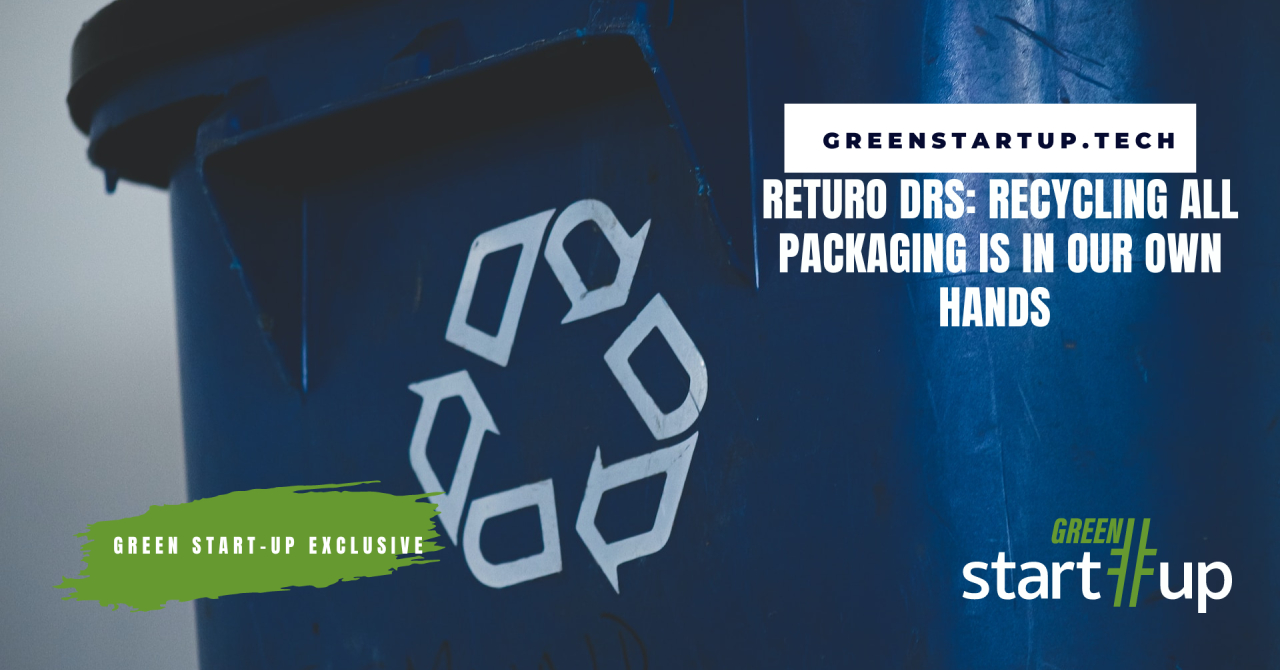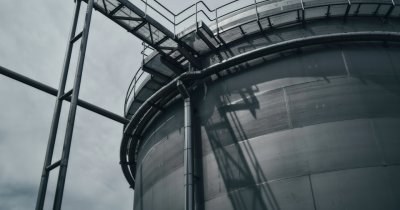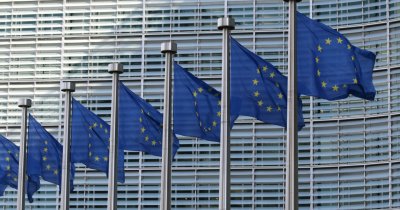We talked to the officials of RetuRO to learn more about how the waste will be collected, what is Romania's current rate of recycling and what are the expectations regarding the program.
Companies that produce or sell bottled products, such as water, juices or different types of alcohol, in packaging that's not reusable made of plastic, glass and aluminum, with sizes between 0.1 and 3 liters, had until the end of February this year to register in RetuRO's database.
Those who didn't risk being sanctioned according to the law with fines of up to 40.000 RON or the temporary termination of the economic activity until they register in the system.
RetuRO was appointed administrator of DRS in Romania in August 2022 and Gemma Webb, with whom we've talked about the plans and expectations of this system, joined the team a couple months later, in November 2022, being the very first employee. She told us that "RetuRO’s team is still in the first year of construction. And that's exactly what we've been doing - we built a team, then a viable implementation plan, and then we began the process of obtaining funding for the largest circular economy project in the country."
By this autumn, RetuRO plans to have 40 employees. while by spring next year, the company could count as many as 600 employees.
RetuRO's beginnings
RetuRO was established by representative associations of beverage producers and retailers to manage the deposit return system, currently being implemented in Romania.
The company, Gemma told us, was formed as a not-for-profit organization, which means that, through its constitutive act, it is committed to reinvest any potential profit exclusively in the development of the system.
The Association of Soft Drinks Producers for Sustainability (30%), the Brewers of Romania Association for the Environment (30%), the Association of Retailers for the Environment (20%) and the Romanian state, represented by the central environmental authority, holding 20% of the shares, are all four of RetuRO's shareholders.
RetuRO's mission is to implement Romania's largest circular economy project - the Deposit Return System.
The implementation of DRS is crucial so that Romania can achieve its EU-wide goals regarding the collection and recycling of plastic packaging. The system should help the country become a cleaner space, with much less pollution across the ecosystems. Thus PETs, but also other type of waste could get way easier in recycling centers, instead of being forgotten in nature or near roads.
How will DRS work in practice
"The DRS aims to encourage the return of single-use beverage containers for recycling, thereby contributing to increasing the quantity and quality of materials collected for recycling. Our goal is to collect 7 billion packages from the market annually", Gemma Webb said for Green Start-Up.
"Packaging made of glass, plastic, or metal, ranging in volumes from 0.1 liters to 3 liters, used for various beverages like beer, alcoholic beverage mixes, cider, other fermented beverages, juices, nectars, soft drinks, mineral water, and any other drinking water, wines, and spirits, is eligible for DRS, but only if it carries the DRS marking (logo and EAN barcode)."
Additionally, the packaging should be returned whole, undamaged, and fully emptied of its contents.
Thus, when buyers will purchase products packaged in the aforementioned materials, they will pay a 50 bani-worth warranty. After they used the packaging, they will return it to any of the collection points that are available, where they'll get the money back, without needing the receipt for the product.
RetuRO's representative added that "at the same time, the producers will need to pay an administration fee for the Deposit Return System (DRS) to RetuRO, which will be calculated based on the material, weight, volume, and quantity."
Last, but not least, for a better functioning of the system, RetuRO will reimburse the retailers for the deposits they paid to consumers. Additionally, retailers will receive a handling fee based on the number of containers collected from citizens. Therefore, the retrieval of containers is a paid service, not a free obligation for retailers.
Consumers must also know that every retailer with a surface over 200 square meters is a designated collect point.
Where can packaging be returned
The DRS is a national project and it will be implemented in the entire country. According to the law, every economic operator that produces, imports, or sells beverages in packaging included in the scope of DRS will be part of the program.
"Essentially, each retailer - big or small - will have the obligation to ensure the individual collection of packaging. Retailers with stores under 200 square meters can associate and organize collection points in collaboration with local municipalities. The details can be established at the local level, following the law. Also, they will have two options for the collection process – manual or automatic. Each retailer can choose the option that suits it best", RetuRO's CEO told us.
Who will recycle the packaging
Returned packaging in stores will be sent to regional collection and sorting centers and then forwarded to recyclers.
RetuRO will not perform the actual recycling of the packaging. This process will continue to be the responsibility of recycling companies. These companies will be selected through best price tenders, which is, in fact, one of the main funding sources for DRS.
RetuRO's representative told Green Start-Up that"up until this moment, we have evaluated the list of recyclers and their processing capacities, and in the coming period, we will have specific discussions with them."
In total, there will be 17 counting and sorting centers at the national level, developed gradually until the half of next year, in parallel with the development of DRS. Two large centers already exist in Timișoara and Bucharest and by mid-2024 the rest will also be finalized.
DRS was made possible with hundreds of millions of funding
"We have secured an impressive sum of 426 million lei, which will be instrumental in revolutionizing the recycling practices of 19 million Romanians", Gemma Webb, the CEO of RetuRO told us.
The funding received strong involvement and support from the producers that are also shareholders, such as Bergenbier (Molson Coors), Coca-Cola HBC and United Romanian Breweries Bereprod (Tuborg).
Romania's current recycling efforts
Romania is among the worst-performing European countries when it comes to the rate of recycling. Thus, "in 2020, Romania's recycling of packaging waste reached a concerning low of 39.87%, ranking last among European Union countries. This represents a decline of nearly 5% compared to 2019", according to Gemma Webb.
The unpredictable legislation and the lack of campaigns among consumers are two of the main reasons that led to this terrible performance.
On the other hand, certain EU countries are leading the charge in successful recycling rates. Belgium leads with an impressive 79.2%, followed closely by the Netherlands at 74.7%, and Luxembourg at 71.9%.
What are the expectations for Romania's most intense collection and recycling effort so far
RetuRO's representatives believe this nation-wide effort will be a success in improving Romania's reputation as a sustainable country regarding the collection and recycling capacity of post-consumption packaging.
Thus, "DRS in Romania will be the second largest such project in Europe (after Germany) and, effectively, the largest project that strives to be the driving force behind a cleaner, more sustainable country."
What can consumers and companies do to become more sustainable
Gemma Webb believes that it is crucial for consumers to realize their individual power when it comes to the ability to change.
"It's about every individual, every community, and every organization coming together and making conscious choices to reduce, reuse, and recycle. By collectively adopting eco-friendly habits, we can significantly reduce our environmental footprint", she said.
Also, RetuRO's CEO gives customers some piece of advice everyone can consider starting today:
- Opt for products with minimal or no packaging and choose reusable or refillable options whenever possible and/or choose Eco-Friendly materials;
- Recycle properly and ensure that you properly sort and recycle packaging materials;
- Advocate for change and support any local initiative – a good example will be DRS; we’re relying on the active involvement of every Romanian in the DRS which means to simply return the labeled packaging waste to one of the designated return points.
As far as industry members are concerned, "I believe each company can find a set of rules and guidance depending on the field/sector in which they operate. We are happy to see that many companies are embracing ESG & sustainability practices, as their involvement is crucial for the wellbeing of the planet", RetuRO SGR's representative told us.
Technological progress was important and will continue to play a major role, but the most important thing, in her opinion, is that all companies will educate and encourage their customers to recycle correctly and, at the same time, to get involved in local initiatives.
 Mihai - Cristian Ioniță
Mihai - Cristian Ioniță












Any thoughts?